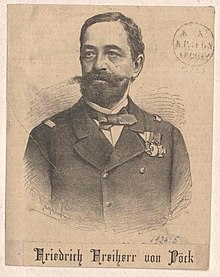Friedrich von Pöck
| Friedrich von Pöck | |
|---|---|
 |
|
| Born |
19 August 1825 Szobotist, Komitat Neutra, Austrian Empire (now Sobotište in Slovakia) |
| Died | 25 September 1884 (aged 59) Feldhof, Austria-Hungary (modern Austria) |
| Allegiance |
|
| Service/branch |
|
| Years of service | 1843–1883 |
| Rank | Admiral |
| Battles/wars |
Second Schleswig War Austro-Prussian War |
Friedrich von Pöck was an Austro-Hungarian admiral and commander of the Austro-Hungarian Navy. In this role, he held the positions as Marinekommandant and Chief of the Marinesektion from 1871 to his retirement in 1883. He had previously commanded the ship of the line Kaiser during the Second Schleswig War in 1864, though he saw no action. During the Austro-Prussian War, he served as the adjutant to Archduke Albrecht during his campaign to defend Venice from the Italian army. He replaced Wilhelm von Tegetthoff, the popular victor of the Battle of Lissa, who died in 1871. Unlike his predecessor, Pöck was unable to leverage his uneventful naval career to secure funding from the frequently hostile Austro-Hungarian parliament, resulting in more than a decade of stagnation for the fleet. Nevertheless, he did introduce the use of torpedo-armed vessels and began developing tactics to use them. He also sent cruising vessels on numerous voyages abroad, which helped to overseas. In late 1883, he suffered a nervous breakdown and was forced to retire, ceding his position to Maximilian Daublebsky von Sterneck in November. Pöck died ten months later, on 25 September 1884.
Friedrich von Pöck was born on 19 August 1825 in Szobotist, Komitat Neutra, in the Kingdom of Hungary, then part of the Austrian Empire. He was the son of the Austrian army officer Colonel Freiherr von Pöck and his wife, Marie Freifrau Horeczky von Kraszna-Horka und Koricsan. Pöck was educated at the old Austrian naval academy in Venice, graduating in 1843. After beginning his service in the fleet, he became a protege of Admiral Bernhard von Wüllerstorf after serving as his second in command during their circumnavigation of the globe aboard the steam frigate SMS Novara in the late 1850s.
...
Wikipedia
